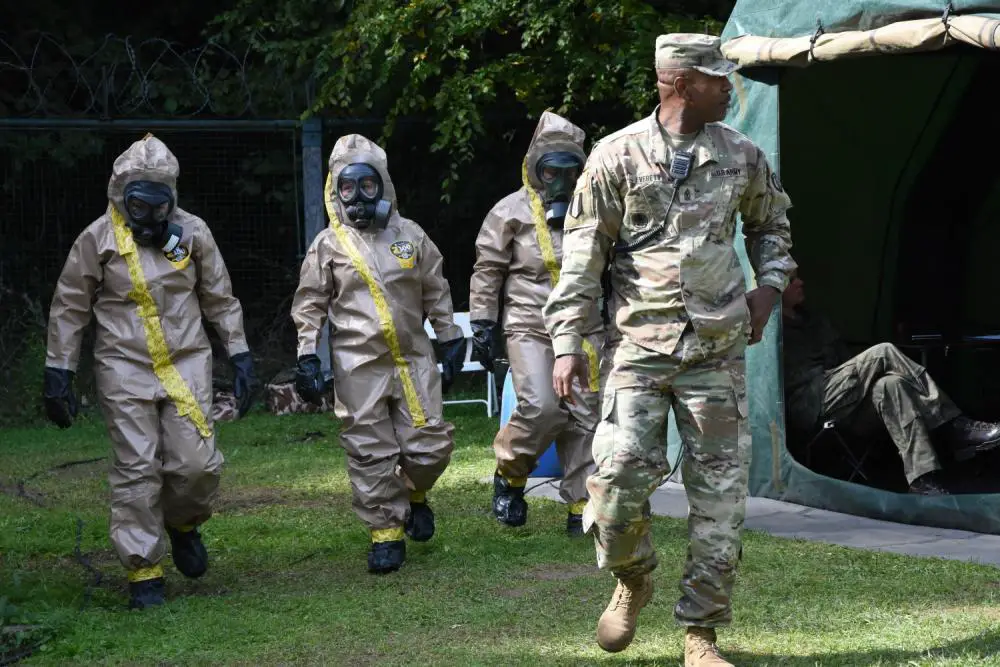Chemical, biological, radiological and nuclear defense teams from 12 NATO nations participated in Slovakia’s 10th Annual Exercise Toxic Valley Sept. 5-16. The Slovak Republic hosts the exercise to provide world-class training to members of the NATO alliance. The exercise, conducted at the CBRN Training and Testing Center Zemianske Kostol’any, gives warfighters the opportunity to train sampling and identification of chemical warfare agents in realistic conditions. The 773rd Civil Support Team from Kaiserslautern, Germany represented the United States at the exercise, with observers from the EUCOM Weapons of Mass Destruction ECJ5-W Office and the NATO Joint CBRN Defence Centre of Excellence in Vyškov, Czechia.
“Toxic Valley 22 – The Next Generation brings together CBRN sampling and laboratory analysis professionals from different NATO member countries. This exercise enables interoperability between our NATO partners on CBRN defense operations. What is unique about this exercise is how to test these warfighters on various CBRN defense scenarios while using live chemical agents. This provides them realistic and challenging training. Additionally, it provides an opportunity for these warfighters to exchange best practices and lessons learned they have from this exercise, overall improving the professionalism of these key NATO units,” said U.S. Army Col. Michael Firmin, director of Education, Training and Evaluation Department.
“Exercise Toxic Valley is important for participating units because it gives soldiers the opportunity to develop trust in their protective equipment and gives commanders the chance to ensure that their soldiers are properly trained to perform their mission in a hot zone. This exercise is also important for the NATO alliance because it allows us to share our processes with each other, in some cases improve our techniques, and at the very least improve our capabilities to work together in common defense of our nations,” said Slovakian Army Col. Oliver Toderiška, commander of the Slovakian CBRN Corps and exercise director of Toxic Valley 2022.

“The ability to conduct live agent training is vital to a CBRN Soldier, especially in this theater. We have the opportunity to gain proficiency and enhance our skill set for CBRN response both from a U.S. military and a partnership perspective with our NATO allies. Usually our CBRN Soldiers get live agent training at our premier Chemical Defense Training Center in the U.S. which is located at Fort Leonard Wood, Missouri. They do the Chemical Defense Training Facility as young Soldiers or later on in their career, but they don’t get to do it often and they don’t usually get to use equipment organic to their unit. ,” said Lt. Col. Mary Durham, commander, 773rd Civil Support Team.
The JCBRN Defence COE is a NATO military body and multinationally sponsored organization which offers recognized expertise and experience to the benefit of the alliance and other partners. Its activities are focused on the NATO transformation process, and operational support by providing defense advice and support of CBRN defense, education, training and exercises. Each team participated in two training scenarios per day for three days, conducting operations according to procedures outlined in the NATO Allied Engineering Publication 66, Handbook for Sampling and Identification of Biological, Chemical and Radiological Agents. The training scenarios included an abandoned factory used by terrorists to make chemical warfare agents, an illicit drug lab, and an underground bunker.
The Slovakian Army is justifiably proud of their accomplishments hosting Exercise Toxic Valley for the 10th time, and produced a small memento for the participants to commemorate the exercise. Interest in the exercise from NATO member nations has continuously increased over the years with 12 countries signing up for 2022 to exercise their SIBCRA teams. Since the facility is not large enough to host 12 teams simultaneously, eight teams exercised the first week with four new teams the second week. The United States team participated the second week along with teams from Belgium, Lithuania and Slovenia. The final day of the exercise was reserved for after action reports and team evaluations.
















